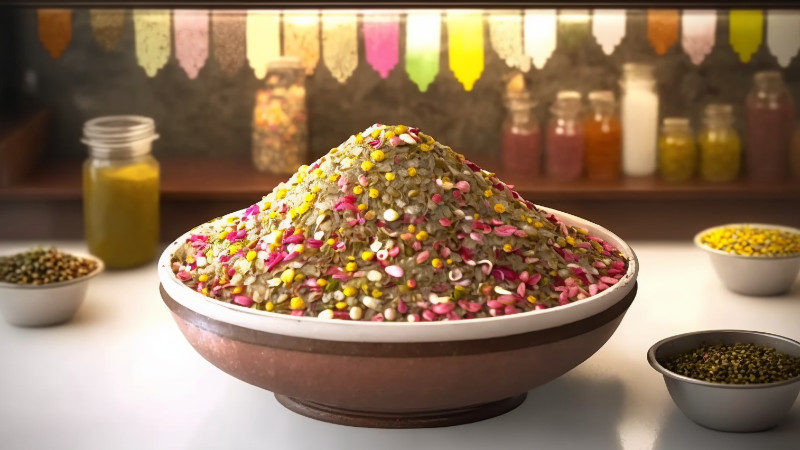Come with us as we take a closer look at Fennel seed vs Clove. These are two spices that have been used for centuries in traditional medicine and cooking. Both have been shown to have potential health benefits, including aiding digestion and fighting off parasites. However, when it comes to gut health and parasite cleansing, which one is more effective?
Fennel seed is known for its ability to soothe digestive issues, such as bloating and gas. It contains anethole, a compound that has been shown to have anti-inflammatory and antibacterial properties. 1
Fennel seed has also been used as a natural remedy for parasites, as it is believed to have anthelmintic properties that can help eliminate intestinal worms and other parasites. 2
Clove, on the other hand, is a spice that is commonly used in cooking and has been used in traditional medicine for its antiseptic and analgesic properties. 3
It contains eugenol, a compound that has been shown to have anti-inflammatory, antioxidant, and antimicrobial properties. 4
Clove has also been used as a natural remedy for parasites, as it is believed to have anthelmintic properties that can help eliminate intestinal worms and other parasites. 5
Let’s get into the Fennel seed vs Clove discussion!
Table of Contents
Fennel Seed vs Clove; What is the Difference?
Fennel Seeds
Fennel seeds come from the fennel plant (Foeniculum vulgare) and are a common ingredient in many cuisines around the world. They have a sweet, licorice-like flavour and are often used to add flavour to sausages, bread, and desserts.
You may be familiar with Mukhwas, the sweet-coated fennel seed mix that is often served as a digestif in Indian restaurants.

The seeds are also used in traditional medicine to treat various ailments, including digestive issues, menstrual cramps, and colic. 6
Aside from their culinary uses, fennel seeds are also rich in nutrients that may provide health benefits. They contain minerals like calcium, iron, and magnesium, which are essential for growth, development, and maintaining nerve and muscle function. We’ll get into the weeds more with nutritional values a little later.
Fennel seeds also contain antioxidants and anti-inflammatory compounds that may help reduce inflammation and protect against chronic diseases. 7
Clove
Cloves are the flower buds of the clove tree, an evergreen tree native to Indonesia. They have a strong, pungent flavor and are often used in spice blends, marinades, and pickling recipes. Cloves feature in our homemade chai blend which we use in our Irish Sea Moss Tea.
Cloves are also used in traditional medicine to treat a variety of ailments, including digestive issues, toothaches, and respiratory infections. 8
Cloves are rich in nutrients and bioactive compounds that may provide health benefits. They contain antioxidants and anti-inflammatory compounds that may help reduce inflammation and protect against chronic diseases. 9
Cloves also have antimicrobial properties, which may help fight against harmful bacteria and parasites in the gut. 10
While both fennel seeds and cloves have been used for centuries in traditional medicine to treat digestive issues and other ailments, more research is needed to fully understand their potential health benefits.
How to Use Fennel Seeds and Clove for Gut Health and Parasite Cleanse

Fennel Seed and Clove Tea Recipe
Fennel seed and clove tea is a popular home remedy for gut health and parasite cleanse. The tea is easy to make and can be consumed daily to prevent the growth of harmful parasites in the gut. Here is a simple recipe for fennel seed and clove tea:
- 1 teaspoon of fennel seeds
- 1 teaspoon of cloves
- 2 cups of water
Instructions:
- Bring the water to a boil in a saucepan.
- Add the fennel seeds and cloves to the water.
- Reduce the heat and let the mixture simmer for 5 to 10 minutes.
- Strain the tea into a cup and enjoy!
Fennel Seed and Clove Oil Recipe
Fennel seed and clove oil may be used topically, or some natural medicine specialists may advise that it is ingested to help with gut health and parasite cleansing.
Please keep in mind that most healthcare professionals will opt for a pharmaceutical solution to a parasite issue should you have one. Some issues with parasites can be very serious, so it is always a good idea to seek professional support instead of self-medicating.
A simple recipe for fennel seed and clove oil is as follows:
- 1 cup of carrier oil (such as coconut oil or olive oil)
- 1/4 cup of fennel seeds
- 1/4 cup of cloves
Instructions:
- Combine the carrier oil, fennel seeds, and cloves in a saucepan
- Heat the mixture on low heat for 30 minutes
- Let the oil cool strain it into a glass jar, and
- Apply the oil topically or ingest it as directed by a healthcare professional.

Fennel Seed and Clove Supplement Dosage
Fennel seed and clove supplements are available in capsule or tablet form. The dosage may vary depending on the product and the individual’s needs.
Again, it is important to consult with a healthcare professional before taking any supplements. Some general guidelines for fennel seed and clove supplement dosage may include:
| Supplement | Dosage |
|---|---|
| Fennel seed capsule | 1 to 2 capsules, 2 to 3 times per day |
| Clove capsule | 1 to 2 capsules, 2 to 3 times per day |
| Fennel and clove capsule | 1 to 2 capsules, 2 to 3 times per day |
It is important to follow the recommended dosage and not exceed it without consulting with a healthcare professional. Fennel seed and clove supplements may interact with certain medications and should not be taken by individuals with certain medical conditions.
7 Fennel Seed vs Clove Precautions and Side Effects
Precautions for Fennel Seed vs Clove
While fennel seeds and clove are generally considered safe for most people, there are some precautions to keep in mind:
- Individuals who are allergic to plants in the Apiaceae family, such as celery, carrot, and parsley, should avoid fennel seeds. 11
- Clove oil should not be ingested as it can cause severe liver damage. 12
- Pregnant women should avoid consuming large amounts of fennel seeds as it may stimulate uterine contractions. 13
- Clove oil should not be applied directly to the skin as it can cause irritation and allergic reactions. 14
Side Effects of Fennel Seed vs Clove
While fennel seeds and clove are generally safe, they may cause some side effects:
- Fennel seeds may cause digestive issues such as nausea, vomiting, and diarrhea in some individuals.
- Clove oil may cause allergic reactions, mouth and throat irritation, and difficulty breathing in some individuals.
- Clove oil may interact with certain medications, such as blood thinners, and should be used with caution.
It is important to consult with a healthcare professional before using fennel seeds or clove, especially if you have any underlying medical conditions or are taking any medications.
Fennel Seed vs Clove Nutritional Values
Both of these natural products have nutritional values that can’t be ignored. Let’s take a look at the Fennel seed vs Clove comparison side-by-side. 15 16
| Nutritional Value per 100g | Clove | Fennel Seeds |
| Manganese | 60.13 mg | 6.53 mg |
| Saturated Fat | 3.95 g | 0.48 g |
| Sodium | 277 mg | 88 mg |
| Fibre | 33.9 g | 39.8 g |
| Iron | 11.83 mg | 18.54 mg |
| Magnesium | 259 mg | 385 mg |
| Potassium | 1020 mg | 1694 mg |
| Zinc | 2.32 mg | 3.7 mg |
| Calcium | 632 g | 1196 mg |
| Polyunsaturated Fat | 3.6 g | 1.69 g |
| RDI per 100g | Clove | Fennel Seeds |
| Sodium | 12.3% | 4% |
| Zinc | 21.3% | 33.67% |
| Copper | 41% | 118.67% |
| Calcium | 63.3% | 119.67% |
| Iron | 148% | 232% |
| Magnesium | 61.6% | 91.67% |
| Phosphorous | 15% | 69.67% |
| Potassium | 30% | 50% |
| Selenium | 13.3% | 0% |
| Manganese | 2164% | 284.33% |
| Vitamin B12 | 0% | 0% |
| Vitamin B6 | 30.3% | 36.33% |
| Vitamin B5 | 10.3% | 0% |
| Vitamin B3 | 10% | 38% |
| Vitamin B2 | 17% | 27.33% |
| Vitamin B1 | 13.3% | 34% |
| Vitamin C | 0.3% | 23.33% |
| Vitamin D | 0% | 0% |
| Vitamin E | 59% | 0% |
| Vitamin A | 3.3% | 3% |
| Vitamin K | 111.6% | 0% |
| Folate | 6.3% | 0% |
| Macronutrient Content | Clove | Fennel Seeds |
| Protein | 5.97g | 6% | 15.8g | 16% |
| Fats | 13g | 13% | 14.87g | 15% |
| Carbohydrates | 65.53g | 66% | 52.29g | 52% |
| Water | 9.87g | 10% | 8.81g | 9% |
| Other | 5.63g | 5% | 8.23g | 8% |
| Fat Content | Clove | Fennel Seeds |
| Saturated Fats | 3.952 g | 0.48 g |
| Monounsaturated Fats | 1.393 g | 9.91 g |
| Polyunsaturated Fats | 3.606 g | 1.69 g |
FAQs
Fennel Seed vs Clove (Syzygium aromaticum): Which is better for gut health?
Both fennel seed and clove have been traditionally used for their medicinal properties, particularly for their ability to improve gut health.
While both can be effective, clove (Syzygium aromaticum) has been shown to have stronger anti-parasitic properties, making it a better choice for parasite cleansing.
Can Fennel Seed and Clove be used together?
Yes, fennel seed and clove can be used together for a more comprehensive gut health regimen. Fennel seed is known for its ability to soothe digestive issues, while clove can help eliminate parasites. Combining them can help improve overall gut health.
How can Fennel seed and Clove be consumed?
Both fennel seed and clove can be consumed in various forms. Fennel seed can be brewed into tea, added to dishes as a spice, or taken in supplement form. Clove can also be brewed into a tea, added to dishes, or taken in supplement form. However, it is important to consult with a healthcare professional before taking any supplements.
Are there any Side Effects of consuming Fennel Seed and Clove?
While fennel seed and clove are generally safe for consumption, they can cause side effects in some individuals. Fennel seed can cause allergic reactions in some people, while clove can cause gastrointestinal upset, headaches, and skin irritation in some individuals. It is important to consult with a healthcare professional before consuming fennel seed or clove, particularly if you have any underlying health conditions or are taking any medications.
Conclusion
In summary, both fennel seed and clove can be effective for improving gut health. However, clove (Syzygium aromaticum) arguably has stronger anti-parasitic properties, making it a better choice for parasite cleansing in the opinion of Researchers.
It is important to consult with a healthcare professional before consuming fennel seed or clove, particularly if you have any underlying health conditions or are taking any medications.
What are your thoughts on the Fennel seed vs Clove discussion? Share them with us on Instagram and Pinterest.
References
- “Antioxidant, Antimicrobial and Antiviral Properties of Herbal Materials” – S. Parham, A. Z. Kharazi, H. R. Bakhsheshi-Rad, H. Nur, A. F. Ismail, S. Sharif, S. R. Krishna, F. Berto, 21 December 2020 [PubMed] [Archive ↩︎
- “Effect of Foeniculum Vulgare Aqueous and Alcoholic Seed Extract against Zoonotic Cutaneous Leishmaniasis” – G. Mostafa, N. Jalallou, S. J. Seyyedtabaei, A. Dadashi, S. E. S. Sabour, 31 March 2021 [PubMed] [Archive] ↩︎
- “Analgesic effect of the aqueous and ethanolic extracts of clove” – M. Kamkar Asl, A. Nazariborun, M. Hosseini, Date [PubMed] [Archive] ↩︎
- “Biological Properties and Prospects for the Application of Eugenol—A Review” – M. Ulanowska, B. Olas, 1 April 2021 [PubMed] [Archive] ↩︎
- “The effect of pumpkin seed cake and ground cloves (Syzygium aromaticum) supplementation on gastrointestinal nematode egg shedding in sheep” – J. Ježek, K. Mirtič, N. Rešetič, J. J. Hodnik, A. V. Rataj, 6 December 2021 [PubMed] [Archive] ↩︎
- “Effects of dietary fennel (Foeniculum vulgare Mill.) seed powder supplementation on growth performance, nutrient digestibility, small intestinal morphology, and carcass traits of broilers” – H. Liu, J. Li, S. Lin, T. Liu, C. Zheng, 28 January 2021 [PubMed] [Archive] ↩︎
- “Anethole and Its Role in Chronic Diseases” – A. C. Aprotosoaie, I. . Costache, A. Miron, 2016 [PubMed] [Archive] ↩︎
- “Syzygium aromaticum L. (Myrtaceae): Traditional Uses, Bioactive Chemical Constituents, Pharmacological and Toxicological Activities” – G. E. S. Batiha, L. M. Alkazmi, L. G. Wasef, A. M. Beshbishy, E. H. Nadwa, E. K. Rashwan, 10 February 2020 [PubMed] [Archive] ↩︎
- “An Overview on the Anti-inflammatory Potential and Antioxidant Profile of Eugenol” – J. N. Barboza, C. S. M. Bezerra Filho, R. O. Silva, J. V. R. Medeiros, D. P. de Sousa, 22 October 2018 [PubMed] [Archive] ↩︎
- “Clove (Syzygium aromaticum): a precious spice” – D. F. Cortés-Rojas, C. R. F. de Souza, W. P. Oliveira, February 2014 [PubMed] [Archive] ↩︎
- “10 Science-Based Benefits of Fennel and Fennel Seeds” – A. Arnarson, J. Kubala, 13 February 2023 [Healthline] [Archive] ↩︎
- “Clove” – RxList Staff, 11 June 2021 [RxList] [Archive] ↩︎
- “Are There Health Benefits to Drinking Fennel Tea?” – D. Brennan, 16 November 2022 [WebMD] [Archive] ↩︎
- “What You Need to Know About Clove Essential Oil” – D. Sullivan, J. Seladi-Schulman, 9 September 2019 [Healthline] [Archive] ↩︎
- “Clove, ground” – USDA Staff, 1 April 2019 [USDA] [Archive] ↩︎
- “Fennel seeds” – USDA Staff, 1 April 2019 [USDA] [Archive] ↩︎
Last Updated on 6 months by D&C Editorial Team


